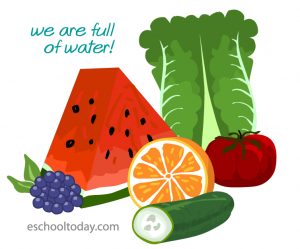- Nutrients in food
Water, an essential food nutrient

A person can survive for many days and weeks without solid food, it is not that easy without water. Water is the most essential requirement of a functioning body.
Water forms about 50-70% of the human body. Think of the wastewater that comes out of our body in the form of urine and sweat. Think of all the blood running through our blood vessels. It is known that the liquid part of blood, called the plasma, is made up of about 90% water. Think about all the digestive juices, moisture on our skin, and lubrication of our joints. They are all made possible by water in our bodies.
Water is essential to the body in at least four ways: as the body’s transportation system, as a lubricant, participates in the body’s biochemical reactions, and as a temperature regulation mechanism.
Our cells get the needed moisture from the water that we drink. Many fruits such as oranges, watermelons, grapes, and apples contain water. Vegetables such as cucumber, tomatoes, and fresh salads contain water too. Digestion of solid foods also results in the release of water into our bodies
The body needs water to regulate its temperature. It also uses water as a medium for blood development. Water is needed for the transport of hormones, nutrients, and sugar to all parts of the body cells. Water is needed for the lubrication of joints. Also importantly, it carries all the by-products of digestion, together with toxic compounds from the body, and passes them out in the form of urine.
This is why we constantly need to drink water, to keep our bodies functioning. How much water do you need to drink in a day? This answer varies from person to person and from region to region. For adults, an average of 2.2 to 2.5 liters a day will be OK. An adult involved in manual labor may require about 4.5 liters a day, especially in higher temperatures.
OUR READING SOURCES FOR THIS LESSON INCLUDED:
- Water: The Nutrient, Linda S. Boeckner, Extension Nutrition Specialist
Food and Nutrition, 1989, Revised January 2009 - P37, Nutrients in Drinking Water. WHO/SDE/WSH/05.09
- Total Carbohydrate. Interactive Nutrition Facts Label, March 2020 U.S Food & Drug Administration https://www.accessdata.fda.gov/scripts/interactivenutritionfactslabel/assets/InteractiveNFL_TotalCarbohydrate_March2020.pdf (Accessed March 2021)
- Healthy Eating for Diabetes: Clinical Dietitians, Food & Nutrition Services, UC Davis Medical Center (5/14) 2014 The Regents of the University of California. https://health.ucdavis.edu/food-nutrition/pdf/Diabetes%20-%20Healthy%20Eating%20for%20Diabetes.pdf (Accessed March 2021)
- Food and Vitamins and Supplements! Oh My! Demystifying nutrition: the value of food, vitamins and supplements. Longwood Seminars, March 5, 2013 The following content is provided by Harvard Health Publications. https://hms.harvard.edu/sites/default/files/assets/Sites/Longwood_Seminars/Nutrition_3_5_13.pdf (Accessed March 2021)
